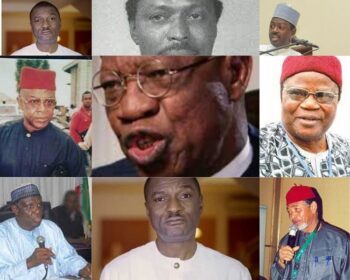Kola Balogun is the first Nigeria Minister of Information while Muhammed Idris is the present Minister of Information and National Orientation.
The image-making of the ruling government of any country lies in the hands of the Minister of Information or whatever name it is called anywhere in the world.
From 1957 till January 15, 1966, there were three cabinets at the federal level by the government of Nigeria’s first (and last unless Nigeria goes back to the parliamentary system) Prime Minister Abubakar Tafawa Balewa.
At the time, specifically on August 30, 1957, the last Governor-General in Nigeria, Sir James Wilson Robertson, announced that Balewa had been appointed Prime Minister, what followed was the announcement of the first cabinet by the Balewa’s government and Kola Balogun, the National Secretary of the NCNC party became the first federal minister of information in Nigeria.
Note:
NCNC is one of Nigeria’s political parties before independence which means the National Council of Nigeria and the Cameroons.
And after the general elections of 1959, another cabinet was announced by the government and Theophilus Owolabi Shobowale Benson was announced as head of Nigeria’s Ministry of Information, Broadcasting, and Culture.
The last information minister during the government of Balewa was Ayo Rosiji. At the time of publication, Layiwola aka “Lai” Mohammed is the incumbent minister of Information and culture, a position he has been occupying since November 2015 till date.
Ministers of Information from 1957 till date are:
| Ministers | Years in Office |
| Kola Balogun | 1957 to 1959 |
| Theophilus Owolabi Shobowale Benson popularly called T. O. S. Benson | 1959 to December 8, 1964 |
| Ayo Rosiji | 1964 to 1966 |
| Johnson Aguiyi-Ironsi’s cabinet | Unknown |
| Yakubu Gowon | Unknown |
| Gen. Murtala Ramat Muhammed cabinet | Unknown |
| Olusegun Obasanjo cabinet | Unknown |
| Garba Wushishi | February 1982 to October 1983 |
| Sam Omeruah | 1984 to 1985 |
| Anthony Ukpo | 1985-1986 |
| Tony Momoh | 1986-1990 |
| Alex Akinyele | 1990-1991 |
| Walter Ofonagoro | March 20, 1995 |
| Abdulsalam Abubakar Cabinet | Unknown |
| Dapo Sarumi | 1999 to 2001 |
| Prof Jerry Gana | May 29, 2001 to July 2003 |
| Chukwuemeka Chikelu | July 2003 to June 2005 |
| Frank Nweke Jr. | June 2005 to May 2007 |
| John Ogar Odey | July 2007 to Dec 2008 |
| Dora Akunyili | December 2008 to March 2010 |
| Labaran Maku | December 2010 to March 2015 |
| Patricia Naomi Akwashiki | March 2015 to May 2015 |
| Layiwola “Lai” Mohammed | November 11, 2015 – May 29, 2023 |
| Muhammed Idris | August 16, 2023 till date |
The uniqueness of the ministers
Kola Balogun
Pioneer minister of Information in Nigeria. He was also the First President of the Nigeria Arts Council from 1958 to 1970
T.O.S. Benson
He was appointed to head the Ministry of Information, Broadcasting, and Culture. He was the first to occupy the position on Nigeria’s independence in 1960
Ayo Rosiji
He was the last in the Balewa’s government as mutinous soldiers on January 15, 1966, overthrew the government.
Sam Omeruah
After the overthrow of the government of Muhammadu Buhari on August 27, 1985, by Ibrahim Babangida, IBB announced his cabinet comprising the military and civilians. And IBB appointed Sam Omeruah as the minister of information.
Anthony Ukpo
First, as a minister of information, Stephen Anthony Ukpo was later announced as the military administrator of Rivers State.
Alex Akinyele
He was a renowned Public Relations expert and a retired customs officer. He would later become the chairman of the Nigerian Sports Commission (NSC).
Walter Ofonagoro
The eloquent Ofonagoro was the most famous minister during the military junta of Sani Abacha. He would be remembered for opening up the broadcasting industry in Nigeria and the foundation that led to licencing of private broadcasting stations in Nigeria.
Labaran Maku
He resigned to contest the 2015 governorship election in Nararawa under APGA. He lost to Umaru Tanko Al-Makura
Layiwola “Lai” Mohammed
Lai Mohammed was a former Chief of Staff to former Lagos State governor Bola Tinubu. He was the National Publicity Secretary of the All Progressive Congress (APC) before the coalition that produced Buhari as the winner of the elections in 2015
Timeline of Obasanjo’s cabinet reshuffle:
- June 2000
- January 2001
- December 2004
- June 2005
- January 10, 2007
Since Nigeria returned to democratic rule in 1999, the administration of President Olusegun Obasanjo in the Fourth republic had the most cabinet reshuffle to date.
He is also known for merging and splitting ministries for efficiency and management



I can never forget Prof Jerry Ganna
Prof. Gana was an eloquent and fantastic minister of information.